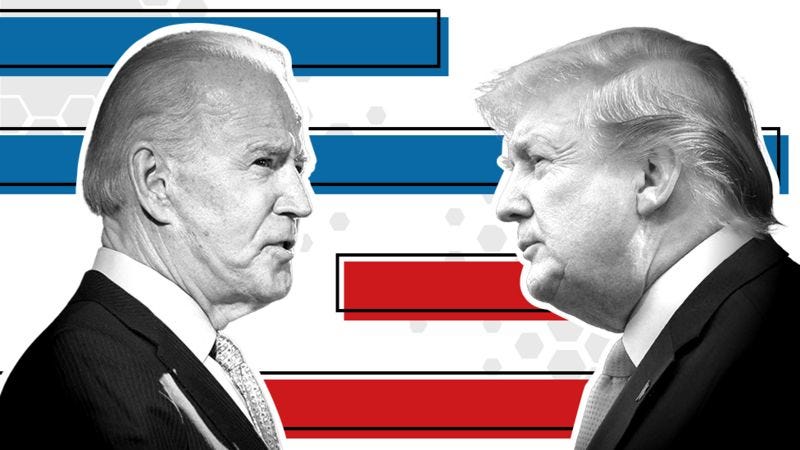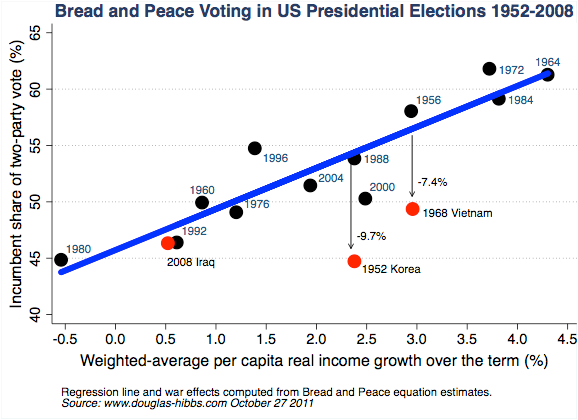
The US is having a very strange election, at so many levels. By all the indicators of enthusiasm, President Trump is way ahead of Vice President Biden. Biden-the-candidate has none of the enthusiasm of Barack Obama in 2008. He seems to have even weaker levels of on-the-ground enthusiasm than did Hillary Clinton 2016. Yet the polls have been telling a consistent story for months: he is going to win the popular vote and the Electoral College handily.
While there are reasons to be sceptical of the polls, for them to be systematically wrong on the level required for President Trump to be re-elected would be truly remarkable. And would say very disturbing things about the state of US politics and institutions. So, what reasons do we have to think the polls might be fundamentally correct?
Peace and Bread: the Peace and Bread equation is a model of US presidential voting developed by economist Douglas Hibbs. It predicts the share of the total Democrat-Republican Presidential vote of the incumbent Party nominee based on the performance of the US economy in the lead up to the election and war casualties.

If we treat the 226,000 or so Coronavirus deaths (682 deaths per million) as war casualties and consider the depressive effect on the US economy of the lockdown measures, then we would predict the incumbent Party nominee (Donald Trump) to be defeated. President Trump is also very poor at the tribal-leader gravitas that US Presidents are expected to provide. Something, in their different ways, both Ronald Reagan and Barack Obama were skilled at. Which has a great deal to do with why they were the notably electorally successful nominees for their respective Parties.

So, if the US election is decided by relatively low-information voters, you add in economic effects, Coronavirus deaths and not fulfilling Presidential gravitas expectations, and even hope for quieter politics, and it is easy to see how the polls would be correct and President Trump would fail to get re-elected. A plausible reading, moreover, that does not require any hint of Trump Derangement Syndrome.
Since the election of President Eisenhower in 1952, the US has had a pretty strong rhythm of two-term Administrations. Eisenhower (1953–61), Kennedy-Johnson (1961–1969), Nixon-Ford (1969–77), Reagan (1981–1989), Clinton (1993–2001), Bush II (2001–2009), Obama (2009–2017) all fulfilled this pattern. The exceptions are Bush I (1989–1993), who was going for the fourth successive term for the same Party: a big ask that economic recession and the third-Party candidacy of Ross Perot put paid to, and Carter (1977–1981).
If Donald Trump turns out to be a one-term President, in a single-term Party incumbency in the White House, that puts him in the same category as President Jimmy Carter and no other postwar President. We can see from the above, that there are reasons to think that he might be so. Though Joe Biden in 2020 seems a very different candidate, at so many levels, than Ronald Reagan in 1980. Then again, President Trump does not look much like President Carter either.
So, the short answer to why we might expect President Trump to lose is the Pandemic. This is ironic at so many levels. Clearly, the economy was going Trump’s way before the Pandemic. Moreover, President Trump has been the least militaristically adventurous President the US has had in decades. He patently would prefer the US to be less involved in overseas military actions. His most notable military action, the drone-strike killing of Iranian general Solemeini, seems to have had a stabilising, rather than de-stabilising, effect on the Middle East.
[ADDENDA: This discussion of results from focus groups accords with the above analysis.]
President Trump has been in office for almost four years. So, he has a record we can examine. What it is clear is the depiction of him as a would-be authoritarian dictator is nonsense. The Pandemic and the riots gave him any number of “Reichstag fire” moments, and he took none of them. Indeed, his response to both the Pandemic and the riots has been notably federalist. Possibly too federalist for his electoral prospects.
Part of what has been going on has been an advocacy economy that desperately needs to identify great social evils to keep the donations and hirings flowing. Between advocacy non-profits, and diversity and similar trainers, billions of dollars rest on characterising US society as pervaded by endless social evils. President Trump, as the Make-America-Great-Again President, has ostentatiously failed to go along with this political economy of moral catastrophising.
Ironically, the desire to have the moral authority of the civil rights movement, and of second-wave feminism, requires that the advocacy economy pretend that the civil rights movement and second-wave feminism were not effective. Which, of course, they were; to striking and startling degrees. But unless the participants in the advocacy economy are still fighting the moral equivalent of Jim Crow and Patriarchy, it is a bit hard to justify those enormous money flows. Having a incumbent President who fails to defer to this advocacy game — on the contrary, pokes at it continually — accounts for much of the animus towards Trump. He threatens both their cognitive identity, as fighters against great social evils, and their income flows. Especially with his Executive Order against critical race theory.
Trump’s defeat would be a great win for the advocacy economy. Even though, if he is defeated, they will probably have had very little to do with him losing.
On the other hand, if it turns out that the polls are systematically wrong, then the advocacy economy is precisely where we should look for the reasons why. The systematic stigmatising and sanctioning of dissenting opinion is a regime of censorship. A regime of censorship there is good reason to think is widely resented. Regimes of censorship create distrustful and dissembling societies. If people are lying to pollsters, systematically not responding to pollsters, or the pattern of voters is systematically different from who the pollsters have been sampling, that will be why.
In which case, Trump being re-elected would not only be a major defeat for the advocacy economy, it would also be a marker of its corrosive effect on American society and institutions. Having billions of dollars of income resting on denying the reality of genuine social progress, and systematically exaggerating or mischaracterising social problems, is not good for the health of any society, or its politics.
Cross-posted from Medium.


"What it is clear is the depiction of him as a would-be authoritarian dictator is nonsense. The Pandemic and the riots gave him any number of “Reichstag fire” moments, and he took none of them."
ReplyDeleteLOL
He took none of them because he knew the military would not obey him, not because he's some committed "federalist" (facepalm). That is all.
https://int.nyt.com/data/documenthelper/6990-milley-memo/fc4fb1c4459fbdbc87a7/optimized/full.pdf
Trump did nothing dictatorial, but he is still presumptively dictatorial because he was blocked even though there is no evidence of such attempt even being made or considered. First, under that logic, you can prove almost anything. Second, Trump continually made it clear he would act if mayors/governors asked. They didn't. so he didn't. Third, I did not say he was a committed federalist, I said his response was federalist, which it was.
DeleteWhitmer of Michigan and Cuomo of New York asked, and famously so at that. And he did nothing. Because Dems be damned. He considered firing Comey. He did. He considered firing Sessions and Rosenstein for not stopping Comey. He did. He's now reportedly considering firing Fray, which he most certainly will if he wins reelection. And that's just the Justice Department. The fact that the Chairman of the Join Chiefs even felt the need to write such an extraordinary and unprecedented memo speaks volume, Lorenzo, especially in light of Trump's relentless assault on voting itself and his blatant refusal to say that he'll accept the result of the election, two things no other president has ever remotely done. On the bright side, the good general has left no doubt as to what the military will do if Trump refuses to concede in the event that he loses. So I'll count my blessings and praise the Lord of Hosts.
DeleteI was talking about riots, not pandemics. And he provided a hospital ship and army temporary hospitals. There were good reasons to sack Comey. As for the memo, in a situation where it was possible National Guard might be called out and folk were clearly trying (as they still are) provoke federal/local cop over-reaction reminding folk to be constitutional is a good thing. As for anti-democratic behaviour, weaponising the national security apparatus against the incoming Administration, as was done by the outgoing Obama Administration, is pretty remarkable. And what other President has been asked whether he would accept the election result (pretty rich from people who clearly refused to accept the 2016 Electoral College result)? Given reasonable scepticism about the sudden Democrat enthusiasm for mail-in ballots, not foregoing right to challenge dubious election results (and his tendency to troll) are in play.
DeleteI'm betting on the polls being systematically wrong. They were in 2016, when everyone expected Hillary to win up to the election itself. And the reasons why people wouldn't be willing to tell a stranger that they plan to vote for Trump have only gotten stronger since 2016.
ReplyDeleteAs for the "Peace and Bread" model, we probably shouldn't count the coronavirus deaths as war casualties, simply because they're not a consequence of wars. Fighting wars is squarely the President's responsibility; fighting disease is not. Presidents get turned out when they start wars and lose them, but not when they respond badly to natural disasters.
Constitutionally, it is true wars are presidential in ways that pandemics are not, and I do think there is an ameliorating effect from the difference between a war and a pandemic: I just don't think it eliminates the similarity.
DeleteWell, I was right about the polls being systematically wrong.
DeleteYep. The question now becomes. error, incompetence or malice?
DeleteTrump will win by a landslide
ReplyDelete